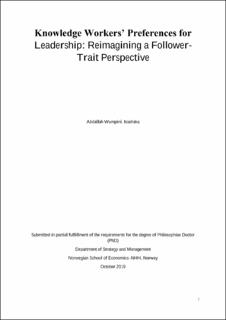| dc.description.abstract | This dissertation contributes to the research on the leadership of knowledge workers. The
dissertation comprises four articles and joins the discussion on why there is still little agreement
among scholars as to how knowledge workers (KWs) should be effectively led, if at all. Article
1 provides a timely synthesis and identifies the research gaps at the root of the matter. One
major root cause of this disagreement seems to be that the concept of who is a knowledge
worker is ambiguous, and how they are different from other workers has not been conceptually
grounded in the research on the leadership of KWs. Article 2 builds on research in educational
psychology, proposing a theoretical perspective on how knowledge workers are different from
other class of workers and how this difference forms a basis to speculate about their preferences
for leadership; this theoretical perspective draws on theories of student development and posits
that through education, students undergo psychosocial changes that over time crystalize into a
very defining personality of highly educated individuals (i.e., knowledge workers). In Article
3, an empirical study to assess our theoretical perspective by using a multilevel sample of
employees nested in workgroups in a work setting was undertaken. The empirical results
supported the proposed theoretical perspective of knowledge workers. That is, there were
statistically significant differences in workers’ dispositional tendencies on need for closure,
ambiguity tolerance, moral competence, dogmatism, authoritarianism, and cognitive ability
between (highly) educated persons and persons with lower educational attainment. Yet it
remains to be investigated empirically how these knowledge workers’ dispositions shape
behaviors and responses to leadership structures. This concern was addressed with Article 4.
Using authentic leadership as an exemplar, I examined how knowledge workers’ traits (i.e.,
ambiguity tolerance and dogmatism) shape their responses (creative behavior and charge taking
via psychological empowerment) to authentic leadership, which was accomplished using a
multilevel moderated mediation model. Overall, this study supports the notion that congruence between organizational leadership structures and knowledge workers’ preferences for
leadership is pivotal to leadership effectiveness, an important point that I justify. | en_US |
